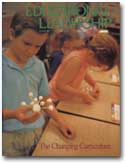Learning to Write Differently
Learning to Write Differently: Beginning Writers and Word Processing, Marilyn Cochran-Smith, Cynthia L. Paris, and Jessica L. Kahn.
Explores the impact of word processing on how students in the '90s are learning to write. The authors studied five elementary classrooms for two years, looking at how teachers and students used word processing in composition. Discusses topics ranging from the basics of operating a keyboard (spacing, erasing, capitalizing, and punctuating) to how to coach beginning writers on word processors.
Available from Ablex Publishing Corp., 355 Chestnut St., Norwood, NJ 07648-2090. 1992. 327 pp. Hardbound, $47.50; paperbound $24.95.
We Teach with Technology
We Teach with Technology, Greg Kearsley, Beverly Hunter, and Mary Furlong.
A basic overview of how technology can be used in various areas of education: from keeping grades and attendance to desktop publishing to online information retrieval and communicating with other classrooms through networks. Each chapter includes resources for additional information and a list of activities for teachers or students. The final chapter provides a list of technology-related organizations and magazines along with computer networks and software publishers and distributors.
Available from Franklin, Beedle, and Associates, Inc., 8536 SW St. Helens Drive, Suite D, Wilsonville, OR 97070. 1992. 168 pp. Paperbound. $16.95.
Social Issues in the English Classroom
Social Issues in the English Classroom, edited by C. Mark Hurlbert and Samuel Totten.
A collection of essays from 25 teachers telling how they helped students become thoughtful, informed, active citizens through dialogue, writing, and literature. The contributors consider topics such as interviewing, ethnographic research techniques, and computer conferencing. Final chapters address “Ethical Guidelines for Writing Assignments” and “Teaching, Feminism, and Social Change.”
Available from National Council of Teachers of English, 1111 Kenyon Rd., Urbana, IL 61801. 1992. 356 pp. Paperbound. $13.95 NCTE members; $18.95 nonmembers.
Civics for Democracy
Civics for Democracy, Katherine Isaac.
This volume aims to encourage students to be active citizens by teaching them about their responsibilities in a democratic society and showing how they can make a difference. A variety of movements are considered: civil rights, labor, women's rights, consumer, and the environment. The text also describes a variety of techniques for participating in democracy, from pamphleteering and newsletters to writing a bill and finding a sponsor.
Available from Essential Books, P.O. Box 19405, Washington, DC 20036. 1992. 390 pp. Paperbound. $17.50.
Creating the Total Quality Effective School
Creating the Total Quality Effective School, Lawrence W. Lezotte.
This brief, three-part monograph first addresses how W. Edwards Deming's 14 Points can be integrated with the tenets of effective schools. The second section explains how to develop a blueprint for creating a total quality school, and the third part addresses implementing the plan. A companion set of videotapes (with the same name) is also available.
Available from Effective Schools, 2199 Jolly Rd., Suite 160, Okemos, MI 48864. 1992. 110 pp. Paperbound. $27.50.
Arts PROPEL Handbook Series
Arts PROPEL Handbook Series, edited by Ellen Winner.
In Pittsburgh, Pennsylvania, the Arts PROPEL approach has guided the development of thought-provoking instruction and authentic assessment in the visual arts, music, and writing. The books in this four-part series describe the Arts PROPEL approach and show how to apply it in music, visual arts, and writing.
Available from the Educational Testing Service, Office of School Services, 37B, Princeton, NJ 08541. 1992. Paperbound. Introductory handbook is 56 pp., $10. Other volumes are 120 pp., $20 each.
The Cooperative Think Tank
The Cooperative Think Tank: Graphic Organizers to Teach Thinking in the Cooperative Classroom, James Bellanca.
A successor to The Cooperative Think Tank, this volume adds another dozen graphic organizers that expand students' repertoire of thinking tools. One graphic, for instance, helps students distinguish between “fat and skinny questions” (fat questions require elaborated answers, skinny questions only short answers). The explanation for each of the organizers is followed by sample elementary, middle, and secondary school activities. Instructional tips and test questions are also included.
Available from Skylight Publishing, Inc., 200 E. Wood St., Suite 274, Palatine, IL 60067. 1992. 134 pp. Paperbound. $15.95.
Measuring Up
Measuring Up: Prototypes for Mathematics Assessment, Mathematical Sciences Education Board of the National Research Council.
Thirteen exercises provide teachers with examples of genuine math problems that will challenge and engage 4th grade students. For instance, students might use a computer to design a quilt or organize data comparing the characteristics of grizzly bears and black bears. Strong emphasis is placed on higher-order thinking, connecting math to other disciplines, communicating ideas about math, and accommodating creative strategies.
Available from the National Academy Press, 2101 Constitution Ave., NW, Box 285, Washington, DC 20418. 1993. 165 pp. Paperbound. Single copies, $10.95. School and bulk rates available.
Hands-On Environmental Science Activities
Hands-On Environmental Science Activities, Eugene Kutscher.
One of a series featuring hands-on activities in science, social studies, reading, and thinking skills, this book presents elementary through high school activities related to ecology, energy, conservation, human and animal populations, pollution, citizen action, and politics and economics. To grasp the importance of camouflage, for example, students hunt through grass for 500 toothpicks, one-fifth of which are green.
Available from Alpha Publishing Company, 1910 Hidden Point Rd., Annapolis, MD 21401. 1992. 260 pp. Spiral-bound, easy-to-reproduce teachers' edition, $35. Paperbound teachers' edition with answers, $45. Student lab manuals, $15.
Invitation to Read
Invitation to Read: More Children's Literature in the Reading Program, edited by Bernice E. Cullinan.
The power of stories pervades this guide to setting up or strengthening a whole-language reading program, which is grounded in the beliefs that (1) children learn to read by actually reading, (2) reading is learned in the same way as are other forms of language, and (3) learning in one area of language helps learning in other areas. The text contains practical teaching strategies, title recommendations for all kinds of students, and ideas about organizing and conducting a literature-based reading program.
Available from the International Reading Association, Newark, DE 19714. 1992. 196 pp. Paperbound. $12, IRA members; $18, nonmembers.
MegaSkills
MegaSkills, Dorothy Rich.
Though written chiefly for parents, MegaSkills ideas (especially those in the first four sections) can be easily adapted to the classroom setting. The text suggests many activities to develop confidence, motivation, effort, responsibility, initiative, perseverance, caring, teamwork, common sense, problem solving, goal orientation, and learning skills. Many interesting asides appear in boxes, such as a rhyming mnemonic for remembering phone numbers: “Dial 555-0309. You'll reach Grandma all the time.”
Available from the Houghton Mifflin Company. (800) 225-3362. 1992. 363 pp. Hardbound, $24.95. Paperbound, $12.95.
Zapp! in Education
Zapp! in Education, William C. Byham, Jeff Cox, and Kathy Harper Shomo.
This guide to the empowerment process is told as an amusing and fantastic narrative. Poor Joe Mode, principal of Normal High School, is beset by the assistant superintendent, Mary Ellen Krabofski, whose displeasure might in some way be related to the fact that Mode's notebook entries on what is wrong at his school run on for two pages, single-spaced. Finally Mode discovers the Soul of Zapp! (offer help without taking responsibility for action), and his story eventuates happily.
Available from Development Dimensions International, World Headquarters—Pittsburgh, 1225 Washington Pike, Bridgeville, PA 15017-2838. 1992. 243 pp. Paperbound. $10 ($12.50 in Canada).





